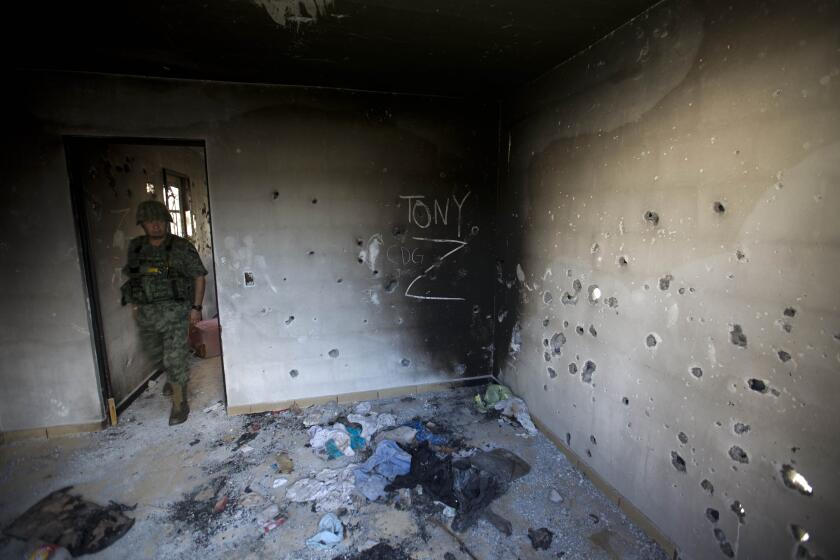REVOLUTIONARY IRAN Challenge and Response in the Middle East <i> by R. K. Ramazani (Johns Hopkins University Press: $10.95) : </i>
From the political maelstrom that is the Middle East, R. K. Ramazani, professor of government and foreign affairs at the University of Virginia, builds a lucid, reasoned--if controversial--analysis of the revolution in Iran and the response in surrounding nations as well as in the United States. Ramazani challenges the Reagan Administration’s view of Iranians as solely religious fanatics and exporters of terrorism and builds an alternative interpretation by elucidating “the broader context of the history, society, and culture of the Middle Eastern peoples.”
According to Ramazani, the revolution in Iran posed a challenge to its Middle Eastern neighbors, and a major portion of the book is devoted to the repercussions for contiguous Arab states as well as for Israel. “Iran’s revolutionary crusade provoked the Iraqi invasion of Iran,” and thus instigated the Iran-Iraq war. Khomeini’s initial hope to “export the Islamic revolution . . . to pave the way for the ultimate establishment of an Islamic world order” successfully inspired the Shia Muslim populations (which compose a large percentage of the people in Arab states) to take up the Islamic crusade.
But on Dec. 15, 1982, Ayatollah Khomeini declared that the revolution was complete and that what Iran now needed was “stability” and “reconstruction.” While previously Khomeini refused to have any dealings with either of the superpowers, known until then as the “Great Satan” (the United States) and the “Lesser Satan” (the Soviet Union), a week later he called “for an end to Iran’s ‘hermit’ status in world affairs. . . . Khomeini himself had changed the ‘Khomeini line.’ ” The epilogue added to the current edition, on what was called in Iran “the America initiative,” confirms Iran’s willingness to renew relations with the United States and delineates the irrevocable damage wrought by the Iran-Contra scandal. “The National Security Council and the Central Intelligence Agency, in usurping control of American foreign policy toward Iran, not only undermined the popularity of President Reagan at home and the credibility of the United States abroad but also destroyed any short-term opportunities to explore a constructive relationship between the two countries.”
The book’s final chapter is a polemic against current American foreign policies in the Middle East. Because the “mixture of change and continuity” in the region has been poorly understood, Ramazani writes, “the United States has been unable to avoid disastrous policies, as in Lebanon, or wrong-headed ones, as in Iran.” This section suggests guidelines for “a comprehensive, coherent, and effective U.S. policy in the region.” Ramazani’s most damning words accuse the U.S. of perpetuating the status quo rather than risk unexpected change. But the Middle East is an area of the world “profoundly in need of basic change if it is to respond effectively to the challenge of the modern world. . . . To this extent, (the U.S.) has in fact become part of the Middle Eastern problem.” If the United States hopes to “become a major catalyst toward (a) solution,” Ramazani writes in this informative, provocative volume, “we must reverse the past patterns of our policy.”
SPEEDBOAT by Renata Adler (Perennial/Harper & Row: $7.95)
First published in 1976, “Speedboat” collects the seemingly disconnected observations of a nameless journalist living in Manhattan. “I have lived alone now, I think, as long as anybody who is not a hermit or a kook or a spinster who keeps cats. Not entirely alone, but mostly--very far from intermittently. Jim, for instance, when he stays here, makes his telephone calls on his credit card.” The voice is cool, skeptical and unsparing. Similar in structure to Elizabeth Hardwick’s “Sleepless Nights,” the novel’s sum is greater than the accumulation of its fictional parts: It is perhaps the best portrait we have of contemporary urban life among the intellectual gentry. Renata Adler’s most recent work, “Reckless Disregard,” is the controversial analysis of the Westmoreland-vs.-CBS and Sharon-vs .- Time trials.
AGENT ORANGE ON TRIAL Mass Toxic Disasters in the Courts by Peter H. Schuck (Belknap/Harvard University Press: $12.95)
More than a quarter of a million Vietnam vets are taking part in a class-action lawsuit against the chemical manufacturers of Agent Orange, the dioxin-tainted chemical defoliant whose alleged legacy has been rare kinds of cancer and birth defects in the veterans’ offspring. Peter H. Schuck, a professor at Yale Law School, presents a fascinating and highly readable study of what will undoubtedly be a landmark case in the evolution of tort (personal injury) law in times of mass toxic disasters.
ULTRAMARINE by Raymond Carver (Vintage: $6.95)
Best known for his distinguished collections of short fiction, Raymond Carver has had a parallel career as a superb poet. “Ultramarine,” his second major collection of poems, compresses his storytelling into verse with precise craftsmanship and lyricism.
More to Read
Sign up for Essential California
The most important California stories and recommendations in your inbox every morning.
You may occasionally receive promotional content from the Los Angeles Times.










